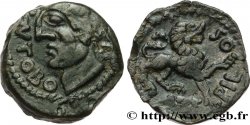Obverse
Obverse legend : ANÉPIGRAPHE.
Obverse description : Tête laurée, à gauche ; la joue tatouée d’une croix, une mèche de cheveux devant le front.
Reverse
Reverse legend : ANÉPIGRAPHE.
Reverse description : Aigle à droite, une croix inscrite dans une rouelle perlée dans ses serres ; un croissant au-dessus de l’aile.
Historical background
GALLIA - CARNUTES (Beauce area)
(2nd - 1st century BC)
The Carnutes were one of the most important and powerful peoples of independent Gaul. Their territory stretched between the Loire and the Seine over the Orléanais, the Blésois and the Chartrain country as far as Mantes, that is to say the greater part of the current departments of Loiret, Loir-et-Cher and Eure-et-Loir and part of Yvelines. Their economic center was located in Genabum (Orléans), but their main oppidum seems to have been Autricum (Chartres). They would have participated in the legendary Bellovèse expedition to Italy. They formed the geographical center of Gaul and, long before the start of the Gallic Wars, Roman merchants knew the way to Genabum (Orléans), then a major commercial center. The Carnutes were also famous for their forest where the annual meeting of the Druids was held.. At the start of the War, Caesar had wintered with the Carnutes in 57 BC.. -VS. and had imposed on them as king Tasgetios, who was assassinated in 54 BC. -VS. The following year, they submit but at the beginning of 52 BC. -VS. , they are perhaps at the origin of the revolt which will raise the whole of Gaul. It is possible that the conspirators met during a druidic assembly. The Carnutes massacred the Roman settlers and merchants of Genabum (Orleans) under the leadership of Cotuatos and Conconnétodumnos. Caesar came to besiege the city which he took, pillaged and burned, marking the beginning of hostilities. The Carnutes then provided a contingent of twelve thousand men to the relief army in order to clear Alesia. After the fall of Vercingetorix, the following year, the Romans carried out a new campaign of pacification and Caesar punished the assassins of the previous year. Caesar (BG. II. 35; V, 25, 29, 56; VI, 2-4, 13, 44; VII. 2, 3, 11, 75; VIII. 4, 5, 31, 38, 46). Strabo (G. IV, 2, 3); Livy (HR. V, 34). Ptolemy (G. II, 8). Kruta: 68, 187, 334.










 Report a mistake
Report a mistake Print the page
Print the page Share my selection
Share my selection Ask a question
Ask a question Consign / sell
Consign / sell
 Full data
Full data









